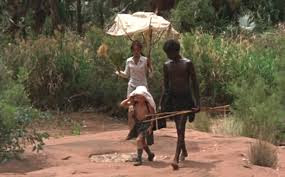Walkabout
Whatever it
was I expected from “Walkabout”, it turned out to be different. Though the
Book’s use of terms like “Mysterious” and “Deep” should warned me, I guess I
expected something more like a Robinson Crusoe tale.
Nicolas
Roeg, who did the “Performance” movie, has this time gone to Australia. We see
a businessman (John Meillon) who look tired. He is well dressed and live in a
sea-side apartment with wife, children and pool. Cut. The man is driving in the
outback with his two children, a teenage girl (Jenny Agutter) and a 6,
presumably, year old boy (Luc Roeg, the director’s own son). He stops the car,
the children set up for a picnic and the man start shooting at the children,
sets fire to the car and shoots himself. Just like that.
The
children are now left on their own in the arid outback very, very far from
home. From what I can tell this is South Australia, some distance north of
Adelaide, an area which is, well, pretty barren. As the children have
absolutely no survival skills and very few supplies it is quite lucky they meet
an Aboriginal boy (David Gulpilil) on a walkabout and that this boy is nice and
wants to help them.
This
becomes a remarkable walkabout for all three of them. The white boy and the
girl have no idea what the black boy is blabbering on about and he in turn just
smile in incomprehension at the girl’s words in English. After a while the
white boy comes to some very crude and basic understanding of the black boy,
not through some superior skill, but because lacking the conditioning from
western civilization he listens and observe the black boy with less cultural
filter. Still much of this walk is about the failure of two cultures to
understand each other, something that goes far beyond the spoken word.
Where the
girl and the white boy see a desolate waste, the black boy sees a land full of
resource. The black boy sees and registers what he wants to see and the girl
fails to recognize things obvious to the black boy. This comes to a head near
the conclusion where the black boy’s sustenance hunting, involving a level of
respect for the animals is held up against the wanton and pointless slaughter by
a group of white hunters as well as the black boys mating dance to the girl which
is misunderstood as a fearsome and savage show, something that seems to deflate
the black boy completely. It is as if he has been trying through the walk to
show her the beauty of her world, to make her understand it and in the end she
is refusing to understand and refusing to embrace her world and instead return
to her own, a world exemplified by the
wasteland of an almost deserted mining settlement and a local caretaker
obsessing about property rights. The black boy is stunned into oblivion as if
his world has been discarded.
The black
boy may be wanting the white girl, but it goes the other way too. We see her
glance constantly go to his crotch and she seems very attentive to how she may
appear to him. As sexual beings we are all the same. Something which is
emphasized by a research camp on the salt flats where sex is foremost on
everybody’s mind, men and women.
Throughout
it all there is this dreamy quality to the movie. There are strange cross-clips
through association and many things are unexplained, seemingly happening for no
reason at all. My interpretation of this is partly the dream world the
Aboriginals believe in and partly that all this could be a dream or a hazy
memory of the girl. When we see her in the end she either dreams or recall an event
from the walkabout and in this interpretation the walkabout is something that
is lacking or lost in her life, an alternative reality that could have been or
that she wished would have been because she is missing it.
Anyway,
this is a much deeper and interesting movie than it appears to be and certainly
one that leaves a lot to think about. Not to mention full of wonderful pictures
from the Australian outback.
It is a
recommendation from me.



